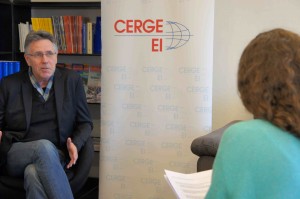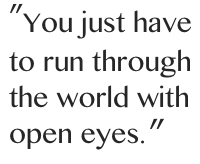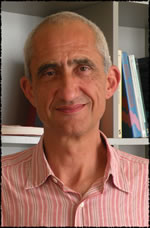CERGE-EI discussed lab rats and experimental economics, among other things, with visiting senior lecturer Andreas Ortmann:
 You are interested in experimental and behavioral economics. Why did you choose this field and who influenced your decision?
You are interested in experimental and behavioral economics. Why did you choose this field and who influenced your decision?
It’s a funny story. To earn my Ph.D., I went to Texas A&M University where one of the first and prominent experimentalists in the US was working. But I didn’t go there to study experimental economics, I went to study industrial organization and public finance. In fact, I never heard about experimental economics. But … I needed to earn money and so I started working for this professor called Ray Battalio – a brilliant guy and real mensch – who conducted experiments with animals (I was a rat-lab technician!) and humans. Even though I was very skeptical at first, experimental economics grew on me and I became interested in it as one way of understand economic problems.
But it’s only one way. It’s not the only way. I also do theory, I do history of thought, and even empirical work if I have to. I don’t believe in one method alone. You take what’s appropriate to understand and solve the problem .
Today a lot of people are doing these types of experiments. How do you see the field changing in the future?
There are lots of issues that experimental economists need to address. For example, there is always the question of external validity of experiments, i.e., the question to what extent laboratory results tell us anything about the real world.
There are also all kinds of issues of how to do the econometrics, and how to evaluate the evidence that is being produced in experiments. Experimental economists mostly talk about statistical significance, but this is really not that interesting if the effect size turns out to be miniscule. You want to talk about economic significance, which is a different concept. We may actually have the wrong tools for understanding these experiments, at least for some of the big issues which we need to address.
What are your current research interests?
Which of my 273 would you like me to talk about? (laughs) Well I’m working on, among other things, evidence production and evaluation. I’m working obviously on what I talked about in my seminar at CERGE-EI: social-impact bonds, which is a recent addition to my research agenda . I’m also working on simple heuristics. Fast and frugal ways of making decisions which contradict some of the basic ideas that economists have on how we make decisions. We usually assume common and full knowledge and rationality when actors make decisions, and I think the evidence shows that under time-constraints and uncertainty we don’t have a lot of time to make decisions and we don’t have full information. We make decisions on incomplete information, and this is one of the big issues I am focusing on.
How do you get inspiration from your research?
 It’s a difficult question because I think there is no algorithm for it. You just have to run through the world with open eyes. And sometimes you have to dive very deeply into a particular topic to understand what kind of open questions there are. Sometimes it just hits you—you say ‘why?’ and then you just go for it.
It’s a difficult question because I think there is no algorithm for it. You just have to run through the world with open eyes. And sometimes you have to dive very deeply into a particular topic to understand what kind of open questions there are. Sometimes it just hits you—you say ‘why?’ and then you just go for it.
I think it is fair to say that it has to do, for the most part, with knowing a field well and reading thoroughly. Of course it helps if you read broadly and don’t just focus on one particular topic. And it always is useful to talk and work with different people with different experiences. There are various strategies to get inspirations and they can all be equally valuable.
Do you usually find unexpected results from your studies?
At my age, little surprises me (laughs). But of course, that’s why we do experiments. You do it because you have a theory and you do an experiment to understand if your theory predicts properly. And sometimes the evidence seems to reject the theory that you tested.
Much of laboratory research is being done precisely because theories didn’t predict properly, and then you try to understand what’s going on. You essentially give theorists more grist for the mill to come up with better theories to explain lab results. Of course there are often situations where a theory doesn’t predict well, and it’s a big surprise. Then you have to go on and try to do better. Write better theories, do new experiments. This is the cycle: theory, experiments, theory, evidence, theory, more evidence, more theory, and so on.
You have written many papers, so you may be the right person to ask the burning question of all young PhD students: where do you see the research gap?
You are asking for the low-hanging fruit, yes? (laughs). It’s an interesting question. It’s a little like the famous efficient market argument: there can’t be money on the street, because if there were, someone would already have picked it up. But that’s not true, because there is always new money being dropped, essentially. There are always new research opportunities. The world is changing and there are always new ideas being generated. In order to understand what’s a new idea, typically it takes some experience and some feeling for what constitutes a good story.
But there are many situations where you come up with something new to the field because you are not caught in this paradigm. So you might see that something is interesting where mainstream economists would never see it. There are so many examples of this.
What is the competitive advantage of CERGE-EI students in choosing a research topic? Since most of the student body is from post-socialist regions, is this the area where they should focus their research?
There shouldn’t be a ‘should’ here. In the first place you must try to become a good economist. After that, if you want to go back to your country, I’m sure you will have plenty of questions and problems to deal with. Just become the best economist you can be, and there will be plenty of opportunities to apply your knowledge.
I can say that good economists are badly needed in the region. Many of the policy decisions are not informed properly by good economics, and that’s a real problem.
How do you perceive the evolution of CERGE-EI?
I think it’s a major success story. It has shown in the region that economics today is very different than the economics practiced here in the past. The way we do and apply economics, and in terms of our ambition, we set a very good example at CERGE-EI. If you look at the rankings of institutions in the Czech Republic, you find CERGE-EI always in the top. I think CERGE-EI has done a lot of good, in the Czech Republic and beyond. You need only look at the career paths of the graduates to see just how successful CERGE-EI has been.
Andreas Ortmann is a professor of experimental and behavioural economics at the Australian Business School at UNSW, Sydney, Australia. He was a professor and senior researcher at CERGE-EI until summer 2009, and he remains affiliated with the Economics Institute of the Academy of Sciences as a visiting senior researcher.
Interviewer: Sophio Khozrevanidz
9 November 2012



